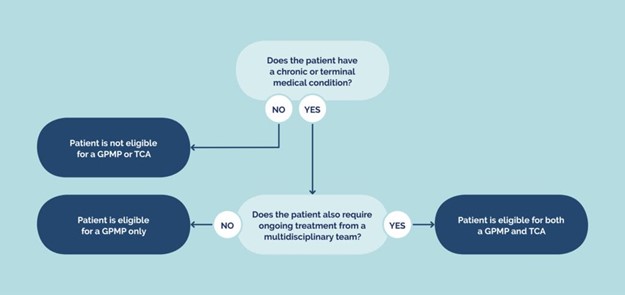General practitioners can offer additional help to patients with chronic conditions through care planning. GPs can prepare a GP Management Plan and Team Care Arrangements, if they determine a patient would benefit from coordinated support.
Please note, all information on this page is relevant at the time of publishing. This information is provided to assist general practices in understanding Care Plans and Medicare Benefits Schedule (MBS) items and incentives. Western Victoria Primary Health Network is not responsible for the compliant use of MBS items. Each provider is responsible for their billing compliance with Medicare.
General Practitioner Management Plan
A General Practitioner Management Plan (GPMP) MBS Item 721 - is available to patients with a chronic or terminal condition and who would benefit from a structured approach and ongoing care from a multi-disciplinary team.
The MBS defines chronic disease as a chronic medical condition that has been (or is likely to be) present for six months or longer.
A GPMP includes setting patient-oriented goals, developing strategies, outlining tasks, and setting schedules to achieve the identified goals. Generally, there are four parts to a plan:
- Patient assessment
- Planning in conjunction with the patient
- Implementation of the plan
- Regular reviews and monitoring
Team Care Arrangement
In addition to a GPMP, a General Practitioner may also prepare Team Care Arrangements (TCAs) MBS Item 723 - if a patient has complex care needs requiring treatment from two or more other healthcare providers, including Allied Health providers.
A TCA requires a GP to work with the other healthcare providers to effectively coordinate a patient’s treatment and support.

MBS Patient eligibility for Care Planning
Medical Benefits Schedule (MBS) support is available for GPMPs and TCAs for:
- Patients in the community
- Private in-patients of a hospital who are being discharged including private in-patients who are residents of aged care facilities
MBS support is not available to:
- Public in-patients of a hospital
- Care recipients in an aged care facility
Claiming frequency
Service description | Item number | Claiming frequency |
| Preparation of a GPMP | 721 | Once every 12 months |
| Coordination of the development of TCAs | 723 | Once every 12 months |
| Contribution to a Multidisciplinary Care Plan or to a review for a patient who isn’t in a residential aged care facility | 729 | Once every 3 months |
| Contribution to a Multidisciplinary Care Plan or to a review for a resident in an aged care facility | 731 | Once every 3 months |
| Review of either a GPMP or TCAs | 732 | Once every 3 months |
Health care clinicians can provide patients with chronic disease management services more frequently in exceptional circumstances. For example, when there is a significant change in a patient’s condition and a service is required more than once. When billing, include the reason in the patient’s account or the claim.
MBS review item 732 is available for reviewing GPMPs and TCAs. Practitioners can claim item 732 twice on the same day. One claim will be for the GPMP review and the other to the TCAs review. The Medicare claimant will then need to correctly fill in the MBS item descriptions and explanatory notes.
Allied health MBS items
Patients with both a GPMP and TCA can claim individual allied health services on the MBS.
- Patients can claim up to five allied health services per calendar year (MBS items 10950 to 10970)
- Indigenous Australians are eligible for up to ten services per calendar year
- An Enhanced Primary Care referral form must be filled out.
Services are claimable from the following allied health providers:
|
|
